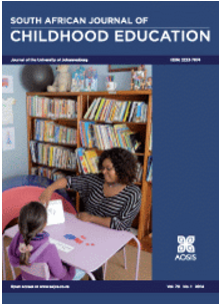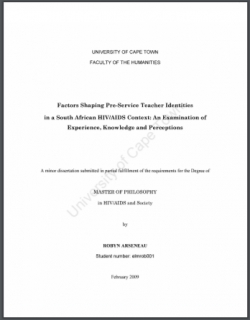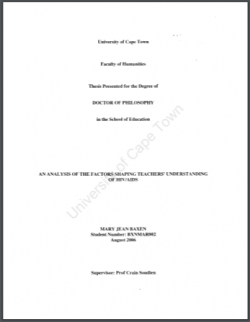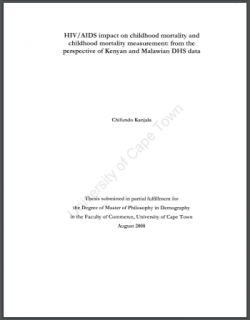An inclusive approach to dealing with HIV/AIDS at schools

Type
Thesis
Authors
Category
ECCE, Foundation, Intermediate
[ Browse Items ]
Publication Year
2005
Publisher
North West University, Potchefstroom, South Africa
URL
[ private ]
Pages
130 p.
Subject
Early childhood education, Foundation Phase, Intermediate Phase, Primary education, Secondary education, School systems, HIV & AIDS, Learners, Teachers, Educators, South Africa
Abstract
The aims of this research were to determine the effects of HIVIAIDS on school systems; and to, on the basis of the findings of both the literature study and the empirical research, make a suggestion for an inclusive approach to dealing with the HIVIAIDS epidemic at schools. The literature review revealed that a school with a high number of learners and educators infected and affected by HIVIAIDS cannot function efficiently and effectively, since learners infected and affected by HIVIAIDS cannot cope with learning and cannot perform their learning tasks to the fullest of their abilities, while infected and affected educators cannot teach effectively because they are often ill and absent from school, and this has an effect on the efficient and effective development of the school. The literature review, also, revealed that HIVIAIDS can have an enormous impact on the learning and teaching situation in most HIVIAIDS-affected schools, but at the same time, inclusive school systems can also have an enormous impact on HIVIAIDS prevention, care and support, especially when supported by inclusive health-promoting educational strategies and collaborative support from other social and educational sectors such as nongovernmental organizations dealing with HIVIAIDS and health, Departments of Social Welfare and Health, and so on. In the absence of appropriate effective inclusive measures, the school system in a community that is seriously HIV-infected is also in danger of being weakened and disrupted. It falls prey to a myriad of opportunistic problems like the high rate of absenteeism, deaths of educators and learners, demotivation, low morale, etcetera, which lead, in turn, to a number of reactive changes and adaptations. The empirical investigation revealed that the majority of respondents who filled in the questionnaire regard illness as the main reason for mortality among educators at their schools. The investigation of the extent of feelings latitudes experienced by respondents who have to carry a heavy teaching workload because of educators who are absent due to illness revealed that the majority of educators: are frustrated, stressed, depressed and not motivated any more to do their work; are less interested in their school work and other school-related activities; are not coping with their teaching work; have developed a negative attitude towards their work; are experiencing low morale; and are feeling like resigning from their teaching job. The empirical investigation also revealed that the majority of respondents who participated in this research regarded sickness of self as the main reason for educator absenteeism at their schools. These results of the empirical results led to the researcher making some recommendations which schools can adopt in order to create inclusive learning and teaching settings where teachers who are always at schools are not unfairly overloaded by the teaching work-loads of those educators who have to be absent from work because of being sick.
Number of Copies
1
| Library | Accession No | Call No | Copy No | Edition | Location | Availability |
|---|---|---|---|---|---|---|
| 1 | Potchefstroom, North West Province, South Africa | Yes |



